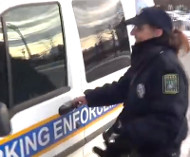6/17/2015
New Hampshire: Supreme Court Victory For Parking Ticket VigilantesNew Hampshire Supreme Court upholds the right to protest against meter maids.

New Hampshire's highest court last week upheld the free speech rights of a group that began feeding parting meters in Keene to protest what they saw as a municipal cash grab. Keene Officials were so irate that they sued the group, Robin Hood of Keene, claiming it was interfering with the city's contract with the meter maids.
The city sought to create a "safety zone" prohibiting anyone from coming within a 50-foot radius of a meter maid for the purpose of video recording or "communicating with" the parking ticket writer. Members of the Robin Hood group insisted this "safety zone" around a meter maid violated their exercise of the First Amendment right to free speech to protest the city's predatory ticketing tactics.
Keene's lawyers gave up early on trying to prevent meter feeding and put all their effort into pursuing the "tortious interference" charge. Neither the trial court nor the high court were persuaded.
"We agree with the trial court that holding the respondents liable for tortious interference based upon their alleged activities would infringe upon the respondents' right to free speech under the First Amendment," Justice James P. Bassett wrote for the court. "As the trial court observed, the respondents' speech -- criticizing the [meter maids] for enforcing parking regulations and questioning the city's authority to regulate parking -- plainly relates to issues of public concern because it involves challenging the political authority of the city."
Most of the group's protests were cordial, as they were preserved on video and uploaded to YouTube. On occasion, however, some group members would shout insults such as "coward" or "thief," which the court noted was speech equally entitled to protection, despite Keene's objections. The court also agreed that following meter maids, closely videotaping their activities and urging them to quit their jobs was expressive activity that, as long as it is non-violent, is entitled to protection.
"The First Amendment protects the right of individuals to engage in public protest for the purpose of influencing societal or governmental change, even if that protest activity causes economic harm," Justice Bassett wrote. "The First Amendment is implicated because the mere threat of tort liability for engaging in protected activity may undermine the free and robust debate of public issues, and pose the risk of a reaction of self-censorship on matters of public import."
The high court did side with the city in ruling that the trial court must hear the factual circumstances of the case to determine whether the city is correct that the Robin Hood members threatened public safety. Under such a theory, a judge could, in theory, decide to craft a narrower buffer zone to restrict the Robin Hooders.
"We express no opinion as to whether the city's allegations, if proven, are sufficient to warrant the trial court's exercise of its equitable power, or as to whether the particular injunctive relief requested by the city would violate the federal or state constitutions," Justice Bassett concluded. "Those are issues for the trial court to address in the first instance."
A copy of the decision is available in a 100k PDF file at the source link below.


